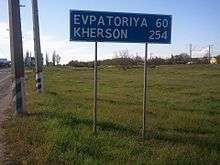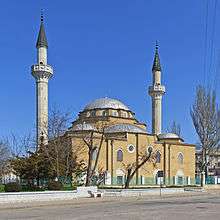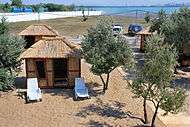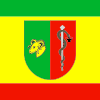Yevpatoria
| Eupatoria Евпатория Kezlev | |||
|---|---|---|---|
|
Eupatoria panorama | |||
| |||
.svg.png) Eupatoria Location of Eupatoriya within Crimea | |||
| Coordinates: 45°11′38″N 33°22′5″E / 45.19389°N 33.36806°ECoordinates: 45°11′38″N 33°22′5″E / 45.19389°N 33.36806°E | |||
| Country |
Claimed by: Disputed: | ||
| Republic |
| ||
| Region | Eupatoria municipality | ||
| Area | |||
| • Total | 120 km2 (50 sq mi) | ||
| Elevation | 10 m (30 ft) | ||
| Population (2014) | |||
| • Total | 105,719 | ||
| • Density | 1,618.37/km2 (4,191.6/sq mi) | ||
| Time zone | MSK (UTC+3) | ||
| Postal code | 97400 — 97490 | ||
| Area code(s) | +7-36569 | ||
| Climate | Cfa | ||
| Website |
www | ||
Eupatoria or Yevpatoria[1] is a city of regional significance in Crimea, a territory disputed between Ukraine (as the Autonomous Republic of Crimea) and Russia (as the Republic of Crimea) after Russia annexed Crimea in March 2014. Eupatoria serves as the administrative center of Eupatoria municipality, one of the districts (raions) into which Crimea is divided. Population: 105,719 (2014 Census).[2]
History
The first recorded settlement in the area, called Kerkinitis (Κερκινίτις), was built by Greek colonists around 500 BC. Along with the rest of Crimea, Kerkinitis was part of the dominions of Mithridates VI, King of Pontus, from whose nickname, Eupator, the city's modern name derives.
From roughly the 7th through the 10th centuries AD, Eupatoriya was a Khazar settlement; its name in Khazar language was probably Güzliev (literally "beautiful house").[3] It was later subject to the Cumans (Kipchaks), the Mongols and the Crimean Khanate. During this period the city was called Kezlev by Crimean Tatars and Gözleve by Ottomans. The Russian medieval name Kozlov is a Russification of the Crimean Tatar name.

For a short period between 1478 and 1485, the city was administrated by the Ottoman Empire. Afterwards, it became an important urban center of the Crimean Khanate. In 1783, along with the rest of the Crimea, Kezlev was captured by the Russian Empire. Its name was officially changed to Evpatoriya in 1784. The name comes from the Greek Eupatoria (transliteration from Greek to Russian is Евпатория) in honor of Eupator Dionysius, king of Pontus. In this writing the name of the city came in the French, German, Spanish and English languages at end of 18th сentury. Yevpatoriya - this writing the name of the city came in American English from Ukrainian name Євпаторія, at the second half of the 20th century.
The city was briefly occupied in 1854 by British, French and Turkish troops during the Crimean War, when it was the site of the Battle of Eupatoria. Adam Mickiewicz visited the town in 1825 and wrote one of his Crimean Sonnets here; it was later translated into Russian by Mikhail Lermontov.
_Moinaki_limaani_k%C3%B5rgsoolase_veega..jpg)
The 400-year-old Juma Jami mosque is one of the many designed or built by the Ottoman architect Mimar Sinan. 35-metre minarets rose on the flanks of the building. The mosque was of great state significance. It was here that a ceremony of the declaration of rights of the Crimean Khans was held at their enthronement. Only after that they went to their capital, the city of Bakhchisarai.

After the referendum on 16 March 2014, Crimea became part of Russia. Eupatoriya became a residence of the spiritual ruler of the Karaites, the Gakham. In this connection here, a complex of two praying houses was built under the supervision of the Rabovich brothers, in which forms of the Renaissance and Muslim architecture entwined in a most unusual manner. The ensemble organically incorporates three courtyards. The entrance to it is marked by the gates, built in 1900, which look like a refined triumphal arch.
Modern Eupatoria
USSR
In 1930s it was a question about the medical profile resort of Eupatoria. Natural factors create excellent conditions for the treatment of osteo-articular tuberculosis and other children's diseases. In 1933, at a scientific conference in Yalta, it was agreed that among the Soviet resort towns Eupatoria, Odessa, Anapa, or one of the South Coast of Crimea - the most suitable for the organization of children's resort is Eupatoria. In Eupatoria perfect combination of climatic and balneological factors contributing to the healing of the most serious diseases of this time like tuberculosis . An additional positive factor is the lack of mosquitoes in Eupatoria, as on the southern coast of Crimea, or mosquitoes as in Anapa.
In 1936, the government decided to determine the place of construction of the All-Union children's resort in Eupatoria. In 1938, the approved plan of general reconstruction of the city. During World War II sanatoriums were used as military hospitals. By July 1, 1945 in Yevpatoria operated 14 sanatoriums, have taken 2885 people. By 1980s, in city operated 78 sanatoriums for 33 thousand people. About one million vacationers visited Eupatoria in summer time without the purpose of treatment.
Russia
Today Eupatoriya is a major Russian Black Sea port, a rail hub, and resort town. The population swells greatly during the summer months, with many residents of northern cities visiting for beach recreation. As such, local residents are heavily employed during summer months but are often underemployed during the winter. The main industries include fishing, food processing, wine making, limestone quarrying, weaving, and the manufacture of building materials, machinery, furniture manufacturing and tourism.
Eupatoriya has spas of mineral water, salt and mud lakes. These resorts belong to a vast area with curative facilities where the main health-improving factors are the sunshine and sea, air and sand, brine and mud of the salt lakes, as well as the mineral water of the hot springs. The population of the town is sure to have known about the curative qualities of the local mud that can be found here from time immemorial, which is witnessed by the manuscripts of Pliny the Elder, a Roman scholar (ca 80 BC).
On December 24, 2008 a blast destroyed a five story building in the town. 27 people were killed. President Viktor Yushchenko declared December 26 to be a day of national mourning.[4][5][6][7][8]
Two beaches in Eupatoria have been Blue Flag beaches since May 2010, these were the first beaches (with two beaches in Yalta) to be awarded a Blue Flag in a CIS memberstate.[9]
Economy and Industry
- Industry
- Agriculture
- AO Vympel NPO (MicroElectronics and Electronics and Electrical parts, television and other devices and machinery, metallurgy engineering technology)
- Eupatoria Aircraft Plant and Repair EupAZ EARZ (Mil Kamov Suhoj MiG Yak Il Tu , Su25 MiG31 Yak38 Be12 , transport aircraft and amphibious)
- Construction, Building
Demographics
Ethnic composition of Eupatoria in 2001 according to the Ukrainian census:
- Russians: 64,9%
- Ukrainians: 23,3%
- Crimean Tatars: 6,9%
- Belarusians: 1,5%
- Armenians: 0,5%
- Jews: 0,4%
- Tatars (excluding Crimean Tatars): 0,2%
- Poles: 0,2%
- Moldovans: 0,2%
- Azerbaijanis: 0,2%
Climate
Eupatoria has a humid subtropical climate (Cfa) under the Köppen climate classification with cool winters and warm to hot summers.
| Climate data for Eupatoria | |||||||||||||
|---|---|---|---|---|---|---|---|---|---|---|---|---|---|
| Month | Jan | Feb | Mar | Apr | May | Jun | Jul | Aug | Sep | Oct | Nov | Dec | Year |
| Average high °C (°F) | 4.5 (40.1) |
5.4 (41.7) |
8.6 (47.5) |
15.7 (60.3) |
21.0 (69.8) |
25.4 (77.7) |
28.1 (82.6) |
27.7 (81.9) |
23.1 (73.6) |
17.1 (62.8) |
11.3 (52.3) |
7.1 (44.8) |
16.3 (61.3) |
| Daily mean °C (°F) | 1.1 (34) |
1.9 (35.4) |
4.5 (40.1) |
10.8 (51.4) |
15.8 (60.4) |
20.1 (68.2) |
22.6 (72.7) |
22.1 (71.8) |
17.7 (63.9) |
12.3 (54.1) |
7.6 (45.7) |
3.8 (38.8) |
11.7 (53.1) |
| Average low °C (°F) | −2.2 (28) |
−1.5 (29.3) |
0.5 (32.9) |
5.9 (42.6) |
10.7 (51.3) |
14.8 (58.6) |
17.1 (62.8) |
16.5 (61.7) |
12.3 (54.1) |
7.5 (45.5) |
3.9 (39) |
0.6 (33.1) |
7.2 (45) |
| Average precipitation mm (inches) | 36 (1.42) |
31 (1.22) |
29 (1.14) |
30 (1.18) |
29 (1.14) |
43 (1.69) |
40 (1.57) |
33 (1.3) |
40 (1.57) |
31 (1.22) |
35 (1.38) |
44 (1.73) |
421 (16.57) |
| Source: Climate Data.org[10] | |||||||||||||
Area attractions
Famous attractions within or near Eupatoria are:

- Juma-Jami Mosque
- Eupatorian Kenassas
- St. Nicholas' the Miracle Worker Cathedral
- Tekie Dervishes
Famous people from Eupatoria
- Lyudmila Alexeyeva — Soviet and Russian human rights activist
- Simeon Ezravic Douvan — City Mayor and Duma Deputy 1905-1919[11]
- Maria Gorokhovskaya — Russian-born Soviet gymnast
- Nikolaos Himonas (Nikolai Khimona) - painter of Greek descent
- Zula Pogorzelska — Polish cabaret and film actress
- Kseniya Simonova — Russian sand animator and YouTube sensation
- Sergei Sokolov — Russian-born Soviet Marshal
- Ruslana Taran — Russian sailor
- Vitya Vronsky — Russian pianist
Names of asteroid number 6489 and number 24648
Asteroid number 6489 has a name Golevka, which has a complicated origin. In 1995, Golevka was studied simultaneously by three radar observatories across the world: Goldstone in California, Eupatoria RT-70 radio telescope (Yevpatoriya is sometimes romanized as Evpatoria or Eupatoria (Russian origin)) and Kashima in Japan. 'Gol-Ev-Ka' comes from the first few letters of each observatory's name; it was proposed by the discoverer following a suggestion by Alexander L. Zaitsev.
Asteroid 24648 Evpatoria was discovered 1985 Sept. 19 by Nikolai Chernykh and Lyudmila Chernykh at the Crimean Astrophysical Observatory, and named in honor of Evpatoria (thus Yevpatoriya). The minor planet marked the occasion of the 2500th anniversary of the town in 2003.[12]
Twin towns – sister cities
| Arms | City | Nation | Since |
|---|---|---|---|
| Ioannina | |
1989 | |
| |
Figueira da Foz | |
1989 |
| |
Ludwigsburg | |
1992 |
| |
Zakynthos | |
2002 |
| |
Ostrowiec Świętokrzyski | |
2004 |
| |
Krasnogorsky District | |
2006 |
| Lambie | |
2009 | |
| |
Belgorod | |
2010 |
Gallery
 Hydro-massage on Lake Moynaki.
Hydro-massage on Lake Moynaki. Lake Moinaki left, right Black Sea.
Lake Moinaki left, right Black Sea. Odun-Bazar-Kapusu - reconstructed tower of the medieval Kezlev
Odun-Bazar-Kapusu - reconstructed tower of the medieval Kezlev The Juma-Jami Mosque designed in 1522 by Mimar Sinan
The Juma-Jami Mosque designed in 1522 by Mimar Sinan Vacation at the coast of Black Sea in Eupatoria
Vacation at the coast of Black Sea in Eupatoria The port of Eupatoria.Crimea
The port of Eupatoria.Crimea Monument to Crimean Tatar poet Omer Gezlevi
Monument to Crimean Tatar poet Omer Gezlevi Golden beach of the Black Sea coast
Golden beach of the Black Sea coast Holiday on Lake Moinaki.
Holiday on Lake Moinaki. Healing Lake Moinaki
Healing Lake Moinaki Therapeutic mud.
Therapeutic mud.- Tramway
See also
References
- ↑ Ukrainian: Євпато́рія, Yevpatoriya, Russian: Евпато́рия, Eupatoriya, Crimean Tatar: Kezlev, Turkish: Gözleve, Armenian: Եվպատորիա - Eupatoria; Greek: Εὐπατορία, Κερκινίτις - Eupatoria, Kerkinitis, "Little Jerusalem".
- ↑ Russian Federal State Statistics Service (2014). "Таблица 1.3. Численность населения Крымского федерального округа, городских округов, муниципальных районов, городских и сельских поселений" [Table 1.3. Population of Crimean Federal District, Its Urban Okrugs, Municipal Districts, Urban and Rural Settlements]. Федеральное статистическое наблюдение «Перепись населения в Крымском федеральном округе». ("Population Census in Crimean Federal District" Federal Statistical Examination) (in Russian). Federal State Statistics Service. Retrieved January 4, 2016.
- ↑ Brutzkus, Julius (1944). "The Khazar Origin of Ancient Kiev", Slavonic and East European Review, p. 118
- ↑ UPDATE: 26 Killed, 5 Hospitalized After Crimea House Blast, Ukrainian News Agency (December 26, 2008)
- ↑ Death toll of Crimean blast reaches 27, says Emergencies Ministry, Interfax-Ukraine (December 26, 2008)
- ↑ Friday Declared Mourning Day In Ukraine For Victims Of Yevpatoriya Gas Explosion, Ukrainian News Agency (December 26, 2008)
- ↑ Ukraine mourns Crimea blast dead, BBC News (December 26, 2008)
- ↑ 27 dead after Ukrainian apartment blast, CNN (December 26, 2008)
- ↑ Four beaches in Crimea receive international certificates of cleanliness, Kyiv Post (May 12, 2010)
- ↑ "Climate: Yevpatoria - Climate graph, Temperature graph, Climate table". Climate-Data.org. Retrieved October 23, 2013.
- ↑ fr:Sémion Ezrovitch Douvan
- ↑ JPL Small-Body Database, NASA
External links
| Wikimedia Commons has media related to Yevpatoria. |
- Official website
- Yevpatoriya Photo gallery - (in Russian)
- Yevpatoriya City site - (in Russian)
- The murder of the Jews of Yevpatoria during World War II, at Yad Vashem website.



